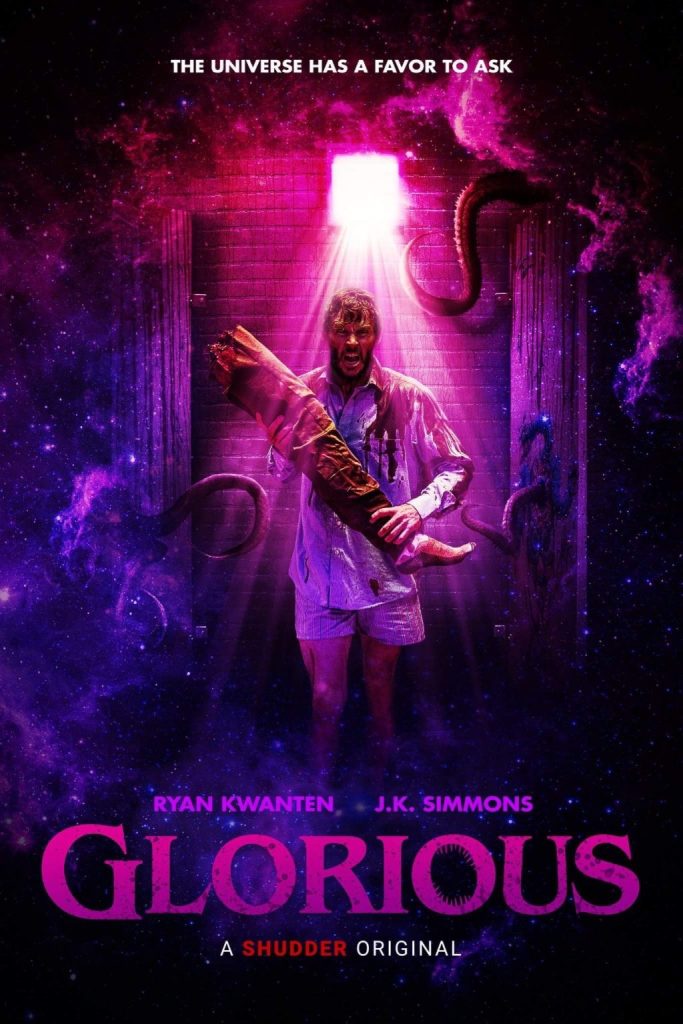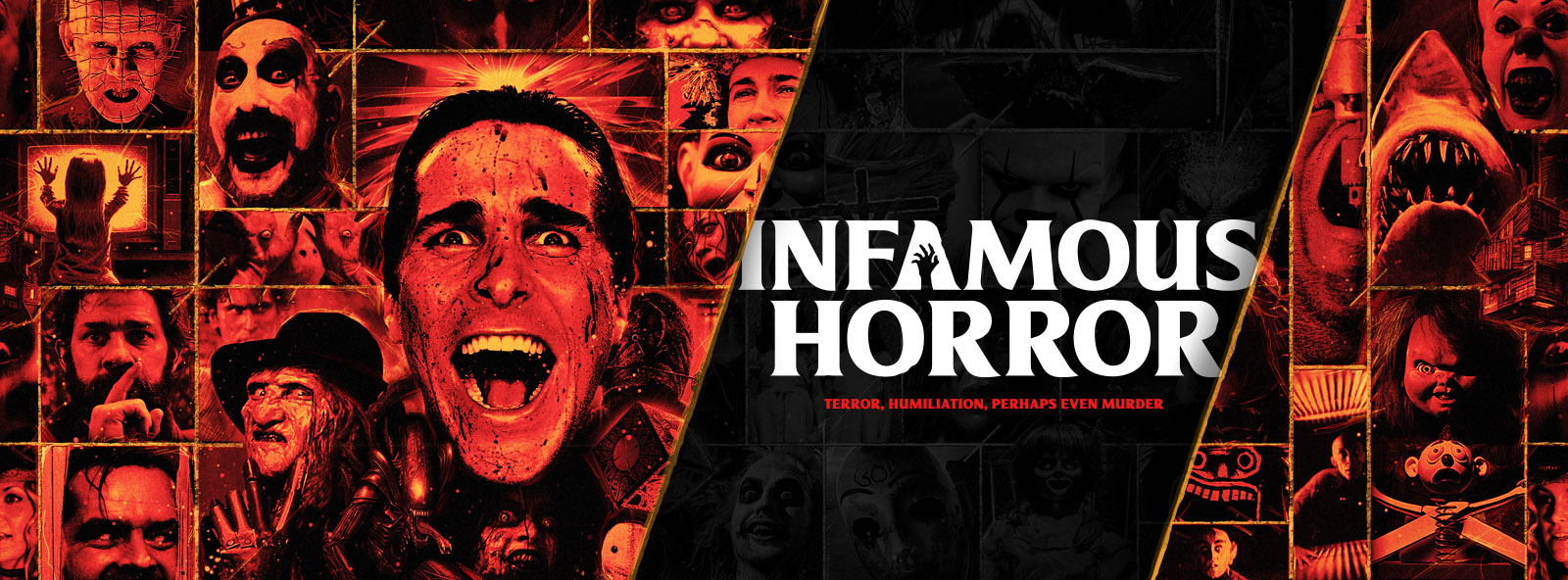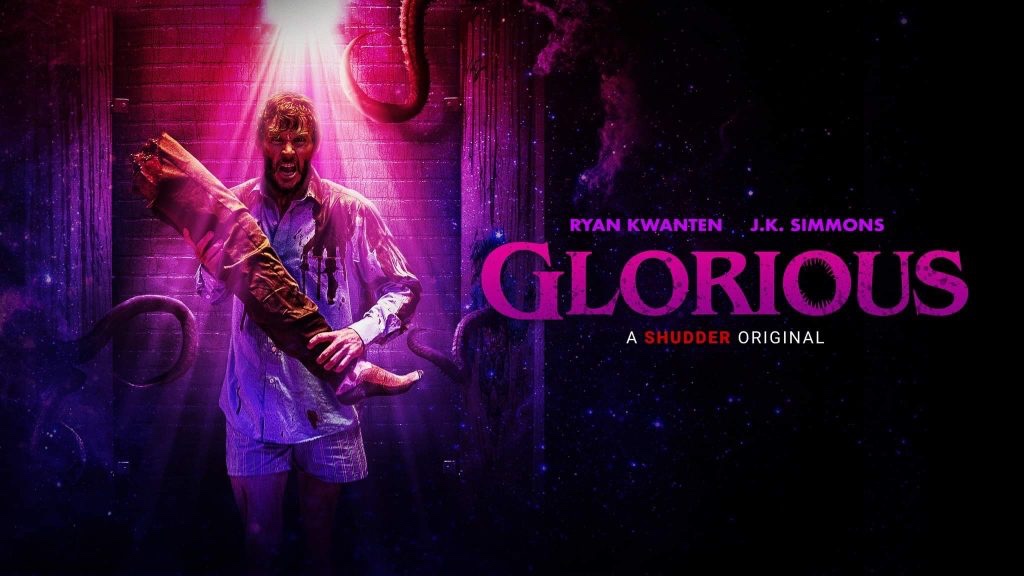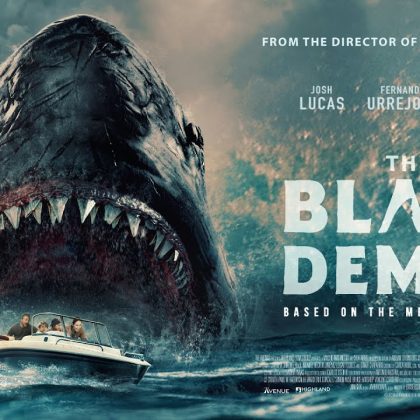Alliance Media Partners and Fallback Plan Productions, in association with Eyevox Entertainment and Citizen Skull Productions, presents Glorious, directed by Rebekah McKendry (Tales of Halloween, All the Creatures Were Stirring). McKendry is co-editor of the book Creepy Bitches: Essays on Horror from Women in Horror (2021). Last year, McKendry also co-wrote a slasher reboot of Bring It On – Bring It On: Cheer or Die (SYFY fall premiere date to be announced).
Glorious stars Ryan Kwanten (True Blood, Dead Silence), J.K. Simmons (Sam Raimi’s Spider-Man trilogy, Whiplash), and Sylvia Grace Crim (Mona Lisa and the Blood Moon). The film is a lean 79 minutes (75 without end credits), so every minute has to count. I think a runtime like this is fine when you’re dealing just one or two characters. From the synopsis, it seems this might be a psychological “two characters in a room picking each other’s brains” movie.
When I first read headlines for this movie like “Lovecraftian Glory Hole Thriller Coming Soon,” I almost thought I stumbled across an Onion article. I was immediately interested because I enjoy all things cosmic horror (I recently covered H.P. Lovecraft’s Witch House). I’m also a fan of Ryan Kwanten – Dead Silence, with its creepy dolls and ripped-out tongues, deserves all the love.
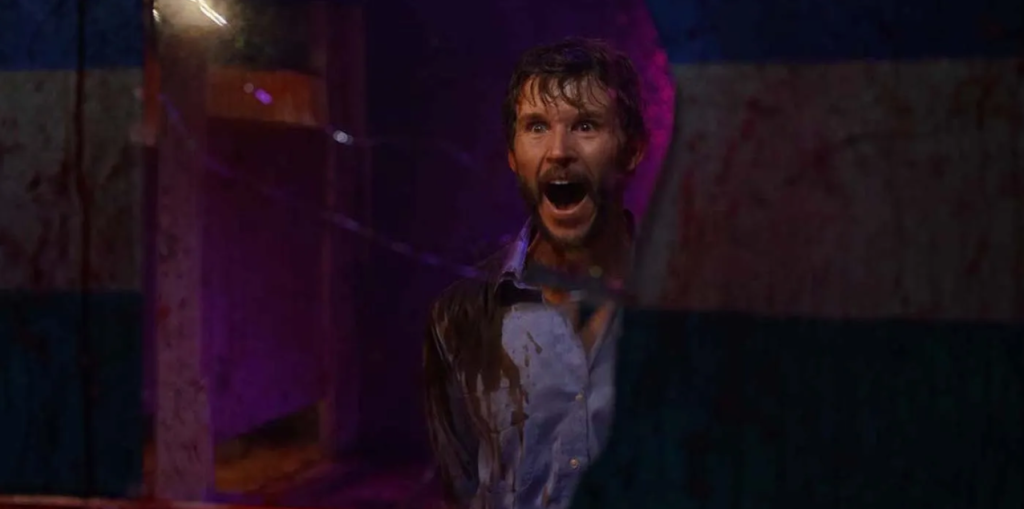
Arrival
Kwanten’s character, Wes, is introduced in a nightmare, surrounded by absolute nothingness (I mean, you can’t have a Lovecraftian movie without an interpretation of the void – I’m glad it features here). He wakes in time to swerve his car and arrives at the rest stop.
Right away there’s plenty of visual information to help the viewer assemble a backstory. Wes is haggard – he probably hasn’t slept in days. There’s a stuffed teddy bear on his dashboard. A mysterious red box sits on the passenger seat beside him.
It’s clear Wes is going through it. He’s having a hard time with a breakup and he’s on edge; he fumes when a candy bar in a vending machine refuses to fall for him – a metaphorical middle finger. The stuffed bear on his dash, gifted by his ex, Brenda (Crim), triggers painful memories. Wes clutches the bear and sobs. Anyone who’s been through a breakup can relate to this, this “Why?! Everything was perfect. What happened?”
Wes burns the contents of the red box and screams with abandon, chugging a bottle of liquor. This reminded me of Nicholas Cage’s performance in Mandy – that spiral into “I don’t care” madness after a devastating loss. Regarding Kwanten’s performance, he understood the assignment – he does well playing a lost soul. Come to think of it, all his characters have a spell of bad luck.
Encounter
Wes wakes without his pants and runs into one of the rest stop bathroom stalls to vomit. He realizes he’s not alone. He lifts his head and finds a painting on the stall of a humanoid creature. Three blue tentacles with sharp teeth branch out from the creature’s head. In the center where the mouth should be – is a glory hole. Occupying the stall behind this painting is a mysterious stranger (unmistakably J.K. Simmons, with his booming authoritative voice). The stranger initially acts as an earpiece for Wes, who finds it all a bit strange – who wants to talk in a bathroom?
We’re in this bathroom for 95% of the film. There’s probably always a challenge when there are minimal sets – how do we make it interesting? But the cinematographer excels at making full use of this space. The painting on the stall is shown from every possible angle. Lighting of all colors is used (purple especially). The set constantly changes – when a character is killed, the bathroom’s splattered in red for the rest of the film.
What’s most unsettling about the stall next to Wes is that it’s pitch-black in the part where we’re supposed to see someone’s feet. Wes distances himself from the stall, realizing the awkwardness of the situation. Speeding up their exchange, the stranger reveals their true identity – they are a genderless, ancient demigod.

The Favor
The demigod tells Wes that the universe needs a favor, and Wes is angry because he feels the universe has done nothing but crap on him. We don’t know much beyond Wes’s breakup, but we can gather that if he’s basically living out of his car, he’s lost more than just his relationship.
The demigod has seemingly unlimited access to Wes’s memories and often appears as Brenda, screaming at Wes to snap out of it and return to the now. I see this as a positive attribute – wanting Wes to be present and stop escaping into the past. One thing about the demigod – I couldn’t help but picture J.K. Simmons just sitting in the stall the entire movie. He’s clearly not there but he has such a distinct voice, which is why I think he was chosen for this part. During those moments where the cosmic power does come out in his voice, it’s definitely effective – he’s someone you don’t want to cross. I’d be interested to know if Simmons was ever on set with Kwanten or if his voice was added during post-production.
I love how much is pulled from the Lovecraft mythos – at one point the demigod shouts at Wes and his ears start bleeding. This happens in Lovecraft’s The Dreams in the Witch House – bleeding from the ears, or even becoming deaf from the frequencies of things Beyond, things human ears were never meant to hear.
Comedic Prison
The story starts out as a very real, relatable scenario and gradually morphs into the fantastic – those are my favorite kinds of stories. Real-world situations in a normal setting that are so delicate, it takes just a thin veil to be lifted to find a whole other world underneath. But the story is funny and over-the-top, too. The premise of a demigod living in a glory hole stall and picking the brain of a man who just went through a breakup – there’s a lot to unpack.
There was a moment that became almost too funny for me (it reminded me of that scene in Austin Powers where Austin is thawed and keeps peeing, interrupting the machine). The demigod is interrupted several times while Wes pees. I’m not saying it took me out of the movie – I love the humor – but I think it made the situation feel less threatening. I don’t feel scared watching this film – I just feel curious.
The stakes are raised when we discover the demigod is manifesting in corporal form. The demigod tells Wes if this happens, they’ll uncontrollably annihilate all life on Earth. The demigod wants to remain in the ether, but to do this, they need to be relieved of their humanly urges – and there’s one part of Wes that can help with this … The demigod’s wording is left ambiguous, and the viewer has to guess what’s required.
It’s funny I almost thought the movie was getting too comedic – the premise of a glory hole situation between a man and an ancient demigod – you should know from the start that it’s a horror comedy. Another funny moment is when Wes is looking in the mirror and pumping himself up to do what he needs to do. In a very Evil Dead II Ash way, he’s half-mad and covered in blood, giving himself a pep talk.
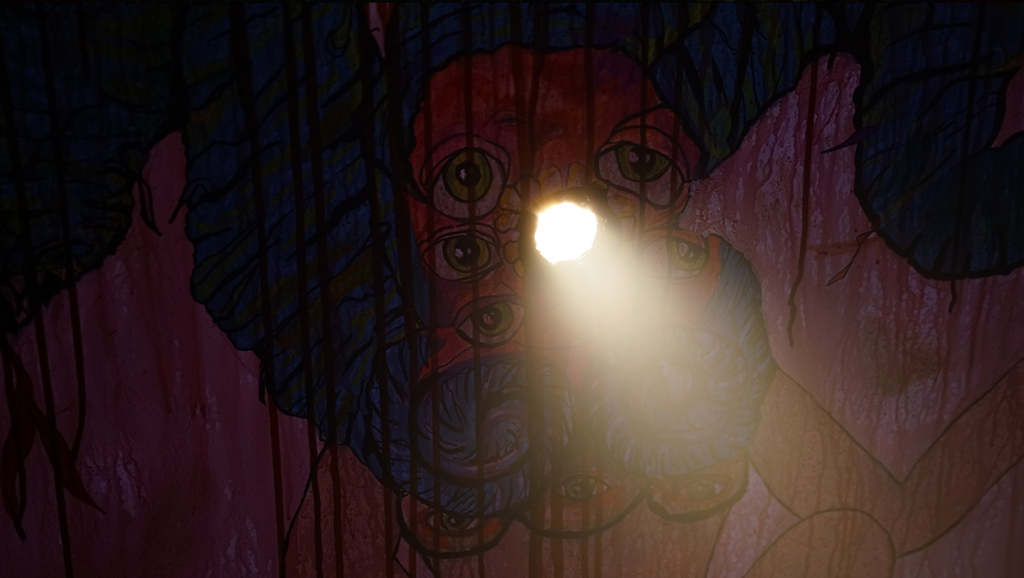
Blood and Guts
The special effects in Glorious are fantastic. The biggest effects (sloshy, squishy ones especially) start happening halfway through. Any character deaths are very well done. There’s also a really cool, maybe even “elegant” slow-motion blood rain sequence. At the end of the film there’s not an inch of the bathroom that isn’t painted with blood.
Beyond the guts, the visual effects are top-notch. I prefer practical effects, puppetry, etc., whenever possible, but I don’t think it would’ve been possible to show what they needed without CGI.
There’s also a surreal moment where the teddy bear from the beginning invades Wes’s dreams and becomes gargantuan, looming over him (think of that early scene in Stuart Gordon’s Dolls).
Revelations
Later in the film, we learn more about Wes’s background. I almost wish certain aspects of his past were revealed sooner and not in the almost-final act. To me, this was mainly supposed to be a breakup story, but it evolves into something else.
Wes ponders if he should let the world crumble, but the demigod argues that if the world goes away, Brenda goes away too. Does he really want to be robbed of remembering her? But throughout the film, anytime Wes tried to think of her, the demigod would have a fit and pull him back. So, the demigod using Brenda as sort of game piece now and saying, “No, she’s important, help her!” feels off. Or maybe doing something for her and for humanity will provide closure.
Cryptic spoiler: I was part-shocked, part-confused by the revelation (via Wes’s memories) of what Brenda found in the red box. It changes your entire perception of Wes’s character. Was he feeling guilty about everything because he truly loved her? Revelations prior about Wes’s upbringing maybe loosely support the big reveal, but I still wish we had more clues early on.
Closing Thoughts
With a twist-revelation that feels last-minute, I think it’s worth rewatching Glorious and revisiting Wes’s memories. At first glance, you think the movie’s going to be about a man who needs to use a glory hole to save the world and get some kind of cathartic closure on a breakup, but in reality, it’s about a balancing of scales.
In hindsight, I wish they made Wes more unlikable. I saw him through 95% of the movie as someone dealing with a bad breakup, someone who had a horrible upbringing, someone who was down on his luck, and then in the last 5% of the movie that changes. It left me wondering who I was supposed to be rooting for. A counterargument to this ending could be that most Lovecraftian tales are about revealing what we never expected. We assumed things about this movie and instead we’re led on a journey to discover the true inner nature of someone. So, in that aspect it’s a pulling apart of layers, which I appreciate.
Glorious sits Fresh on Rotten Tomatoes and is available for steaming via Shudder August 18th. If you’re a fan of horror comedies, Lovecraft, and cosmic horror especially, check it out!
Bret Laurie is an editor, writer, and longtime horror fan in Massachusetts. He contributes film reviews regularly and supports independent horror films and literature through social media. His flash-fiction tale “The Shell” is featured in the DarkLit Press anthology “Beach Bodies.”
